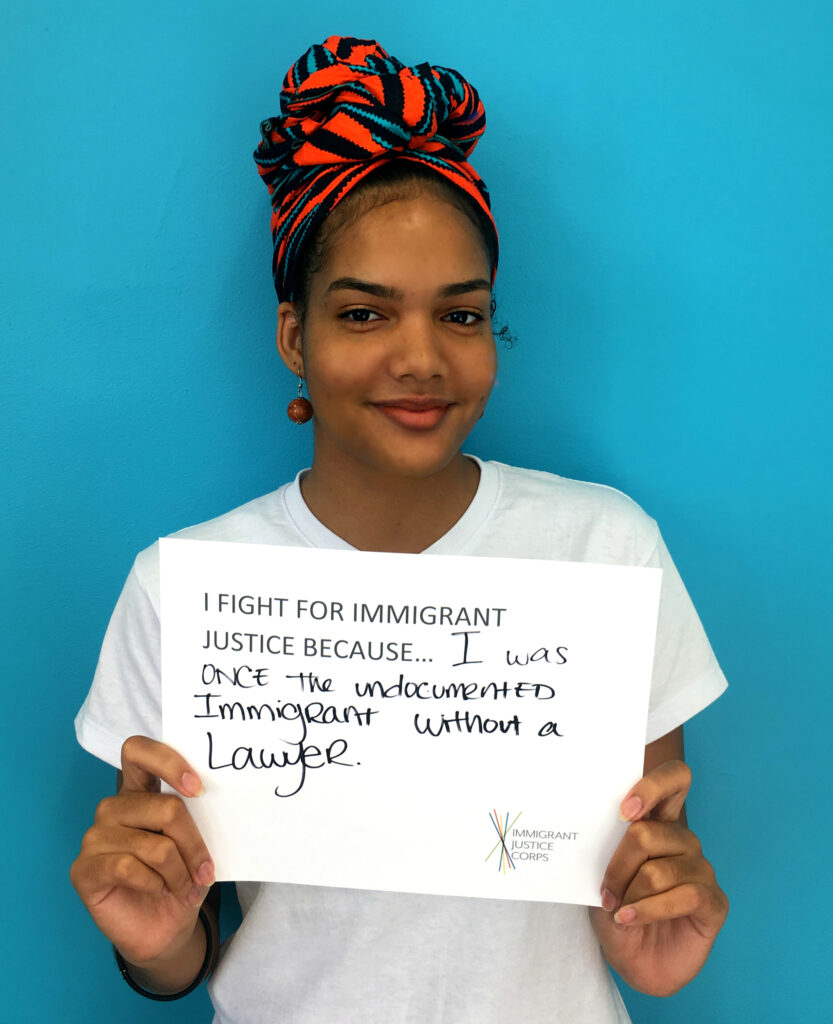Alumni Spotlight: Allison Mandeville
During her time as an Immigrant Justice Corps Community Fellow, Allison Mandeville had a lot of firsts. She was the first Community Fellow ever to be placed at Arab-American Association of New York (AAANY) and the first Fellow to be sent on an extended 3-month rotation to the Karnes Family Detention Center in Texas. She was also the first Community Fellow to help establish IJC’s in-house Adults With Children (AWC) Project, which has now expanded into the broader initiative known as the Long Island Project.
While it’s not typical for Community Fellows to have three different host sites during their two-year Fellowship, Allie was grateful for the opportunity. “Each of my host sites were new and experimental, which was great.”
When it came to being the first for so many different projects, Allie said, “It felt exciting because there was a lot of possibility for how to set things up. The amount of responsibility and trust IJC gave me was amazing but also scary. I learned how to voice concerns and needs.”
As an undergrad at Yale, Allie was a Modern Middle East Studies major with a focus on migration policy. She volunteered with New Haven’s Iraqi community and knew she wanted to pursue either refugee resettlement case work or direct legal representation in the immigration sphere. After hearing about IJC during an informational session she applied and was accepted into the Class of 2015.
Each host site taught her something new and shaped her desire to pursue law school. “Throughout my Fellowship it became clear that being trained as a legal representative is a privilege that gives you an immense ability to do things that you can’t do otherwise. All of the concrete things you are able to do in order to work alongside your clients and help them toward their goals – that felt really powerful and reinforced my desire to go to law school.”
After graduating from her IJC Fellowship in 2017, Allie enrolled at New York University Law School as a Root-Tilden-Kern scholar, a full scholarship program for public interest students. Her IJC co-Fellow, Whitney Braunstein, is also a Root-Tilden-Kern scholar in the same year.
She said her first year of law school was frustrating, but not for the reasons you might expect. It wasn’t the classes she found challenging, it was the lack of client engagement and direct legal work. “It’s super rare to be in law school and already know what it’s like to represent somebody. It’s totally unique. A lot of people feel anxiety in law school, but I’ve already had the opportunity to be a legal representative – I’m in law school to become a better legal representative.”
Eager to get to work, Allie interned the Spring semester of her first year of Law School with Safe Passage Project. As a Fellow working with IJC’s AWC Project, Allie’s clients were exclusively adults with children and the work focused on defensive asylum and some Special Immigrant Juvenile Status (SIJS) cases. “From that I learned that I really like working with children and I wanted more experience with SIJ cases and T-visas and U-visas.”
This past year as a 2L, Allie was thrilled to work 30-40 hours a week at NYU Law School’s Immigrant Rights Clinic, working mostly on detained cases with a criminal component. “It’s a good kind of stress,” Allie said.
Even in law school her connection to IJC remains strong. “IJC is everywhere. When I’m in immigration court or visiting clients in detention centers, I can’t go anywhere without seeing an IJC Fellow or former Fellow.”
Allie is also actively involved in IJC’s advisory committee and recently helped interview candidates for the Class of 2019 of Community Fellows.
Allie will be in clinic again next year for her final year of law school and hopes to continue doing detained work. Before she graduates she would like to get more experience appearing on the record in immigration court. “I want to shake the nerves,” she said. Until then, she is back at Safe Passage Project for the summer.
Looking back, she has some advice for college students interested in pursuing immigration work: “There’s no substitute for client-facing work. There’s no way to learn without doing it and having people guide you. For me, that is what is unique about IJC, especially for Community Fellows, because there really are no other programs that give college students this kind of experience.”
“It’s hard to overstate that IJC put me on the track I’m on. IJC trained me and helped me see that this is exactly what I want to do with my life.”
After graduating law school, Allie hopes to achieve another IJC first – to be the first Community Fellow to return to IJC as a Justice Fellow. We look forward to receiving her application.
